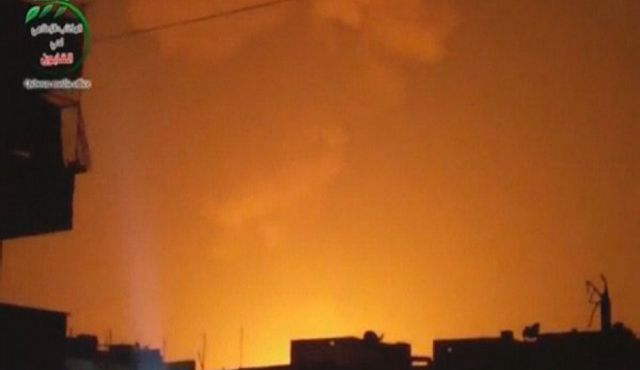Israel destroyed Hezbollah-bound missile shipment in Syria
Reports:
Israel behind the attack on Russian SA-8 surface-to-air missiles near Latakia, according to various U.S. sources.

The Israel Air Force was responsible for Wednesday's attack on a military base in the Syrian city of Latakia, according to reports emanating from the United States.
Reuters quoted a Syrian opposition source as saying that the Israeli planes had struck a strategic missile battery near a village called Ain Shikak where President Bashar al-Assad's forces kept long-range Russian missiles that are among their most powerful weapons.
An Israeli Defense Ministry spokesman was quoted as saying "We're not commenting on these reports."
Other sources said the strike targeted a shipment of Russian SA-8 surface-to-air missile shipment destined for Hezbollah and that the two targets were destroyed.missiles and related equipment Israeli intelligence estimated were to be transferred to Hezbollah.
In addition to striking Latakia, the Saudi-owned news outlet Al-Arabiya said, Israeli planes had also staged an attack in Damascus on Wednesday.
It remained unclear whether anyone was wounded in either of the reported strikes.
Eyewitnesses told the Britain-based Syrian Observatory for Human Rights said Tuhrsday that the explosion, heard on Wednesday, took place near Snobar Jableh, south of Latakia.
Reports in July claimed that the Israeli air force struck a missile warehouse that serviced Russian and Syrian interests in the area. Later, American officials told the New York Times that the strike in July did not succeed in wiping out all of the targeted Russian land-sea missiles, and that Israel was therefore likely to strike again.
The official Lebanese news agency reported that Israeli aircrafts were sighted on multiple occasions Wednesday in the south of the country. According to the report, which was based on a press statement by the Lebanese army, the airplanes entered Lebanese airspace at around 1:40 P.M. and circled over various places before leaving over the Mediterranean Sea near Tripoli and Naqoura at 5 P.M.
A Facebook page run by Syrian rebels claimed that the strike occurred at around 7 P.M. According to the page, a missile was fired from the sea and struck the Syrian base but did not result in any casualties.
Israeli sources declined to comment on the reports.
Last week, Kuwaiti newspaper Al Jarida reported that Israeli fighter planes had bombed a shipment of missiles in the border area between Lebanon and Syria. The report, which according to the paper was based on sources in Jerusalem, has no confirmation from any other source.
The source told the newspaper that the missiles that were destroyed were of an advanced model and were designated for Hezbollah, as part of the strengthening of the organization's missile system. It is not clear whether the attack was carried out on Lebanese territory or on Syrian territory.
Israel refused to comment officially on the publication in the Kuwaiti newspaper, whose reliability is questionable.
The most recent attack on the Syrian-Lebanese border, which foreign publications attributed to Israel, came at the end of July. Syrian opposition forces claimed at the time that Israel Air Force planes had attacked a Syrian army base in the Kuneitra area. According to the reports, the target of the attack was a convoy of missile launchers that was en route to Hezbollah in Lebanon. The report claimed that sorties of IAF planes in the skies of Kuneitra were heard during the night.
The reports in early July claimed that the IAF had attacked missile warehouses near Latakia, Syria, where Russian land-sea missiles were stored. American sources told CNN at the time that the IAF had launched the attack in order to prevent the shipment of advanced land-sea missiles. A month later, The New York Times cited American sources that claimed that the warehouse where the missiles were stored was destroyed in the attack, but at least some of the Yakhont missiles were removed from their launchers and transferred elsewhere prior to the attack. The sources told the newspaper at the time that due to the failure of the attack, Israel was liable to strike again. That was the fourth strike in Syria attributed to Israel within a six-month period.
The following video is archive footage of a strike in Syria on May 19, 2013.
In January, the foreign media reported that Israel had for the first time attacked an arms shipment that was apparently en route from Syria to Hezbollah, when it was parked at the Syrian research center on the outskirts of Damascus. In May, according to foreign publications, Israel once again attacked - twice over the same weekend - a delivery of advanced Fateh-110 ground-to-ground missiles in the Damascus international airport.
MORE FROM HAARETZ.COM
© Haaretz Daily Newspaper Ltd. All Rights Reserved